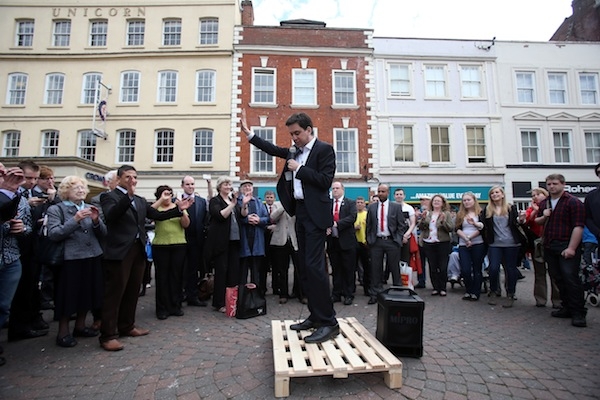Ed Miliband is giving a speech tomorrow morning on ‘the biggest Labour party reforms for a generation’ to shake up the party’s relationship with the unions. It’s a ‘One Nation Politics’ speech, which shows the Labour leader thinks his ‘One Nation’ tag can even be applied to cleaning up a mess in your own party, and will contain what spinners are briefing is a ‘radical’ shake-up of the party. He will say that ‘One Nation is a country where everyone plays their part and a politics in which they can’. This politics is the ‘opposite of the politics we saw in Falkirk. Here’s your guide to what he’ll say tomorrow, and what appears to have been left out:
1. Opt-in arrangements for union members to choose whether or not to join Labour. They will no longer be automatically affiliated as part of their membership. Miliband will say:
‘I do not want any individual to be paying money to the Labour Party in affiliation fees unless they have deliberately chosen to do so. I believe we need people to be able to make a more active, individual, choice on whether they affiliate to the Labour Party.
‘So we need to set a new direction in our relationship with trade union members in which they choose to join Labour through the affiliation fee: they would actively choose to be individually affiliated members of the Labour Party and they would no longer be automatically affiliated.’
This isn’t just a reform that will annoy the unions: it will cost Labour a great deal of the £8 million that it receives from the current arrangement.
2. Primaries for Labour London Mayoral candidate. And there’s a possibility these could be used in parliamentary seats where the local party has few members or needs to be ‘re-energised’.
3. A code of conduct for anyone applying for a parliamentary seat.
4. Spending caps for candidates and the organisations working on their behalf. This would water down the unions’ power to overcome rival candidates through sheer financial might.
5. Standard constituency agreements with unions.
Now, before you get too excited, Miliband is expected to caveat his speech with the admission that many of these reforms will take time (if you want to get an idea of just how long, read Len McCluskey’s anti-reform roar in the Guardian: we may find that fossils have formed over shorter periods of time). But sources close to Miliband are briefing that this speech will show he is not afraid of standing up to the unions, and that he cannot be accused of a sluggish or fearful response to Falkirk. There is of course a notable absence: any meaningful reform of the unions’ role in party leadership contests beyond the end of automatic affiliation, which means the Conservatives can still say he hasn’t gone far enough.
Miliband spent an hour this evening at a meeting of the Parliamentary Labour Party. There were many impassioned speeches from Labour MPs attending the meeting, which was so packed latecomers could barely squeeze through the doors. Coffee House understands that 11 speakers were supportive, two were critical. The Labour leader told MPs that he was quite angry about the situation in Falkirk and that it was ‘about my responsibility to uphold the good name of this party. I have a responsibility to ensure that everything this party does and in every place a candidate is chosen is done in a fair and transparent way’. He told the party that ‘in moments like this, you can sweep it under the carpet or you can seize the moment to make reforms that people have wanted to make for a very long time: we are going to seize that moment.’ He also asked the party for discipline and unity, telling the party that ‘we are not going to let down the hard-working people being screwed by this government’.
Tomorrow he will try to seize that moment, and to seize back control of the narrative, which so far the Tories have led. But over the next few months, the real test of whether Ed Miliband is the strong leader he will try to paint himself as tomorrow will be how much of this reform he can take from the pages of his speech and into reality.






Comments